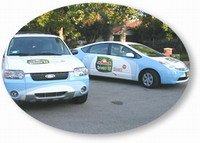Blind people criticize gas-electric hybrid vehicles
Gas-electric hybrid vehicles are under attack from a group that does not drive: the blind.

Because hybrids make virtually no noise at lower speeds when they run on electric power, blind people say they pose a hazard to those who rely on their ears to determine whether it is safe to cross the street or walk through a parking lot.
"I'm used to being able to get sound cues from my environment and negotiate accordingly. I hadn't imagined there was anything I really wouldn't be able to hear," said Deborah Kent Stein, who chairs the National Federation of the Blind's Committee on Automotive and Pedestrian Safety. "We did a test, and I discovered, to my great dismay, that I couldn't hear it."
The tests, admittedly unscientific, involved people standing in parking lots or on sidewalks and being asked to signal when they heard several different hybrid models drive by.
"People were making comments like, 'When are they going to start the test?' And it would turn out that the vehicle had already done two or three laps around the parking lot," Stein said.
As gas prices continue to rise, along with concern about harmful emissions, hybrid cars are increasing in popularity. New hybrid vehicle registrations grew more than 49 percent across the United States in the first seven months of 2007 compared to the same period in 2006, according to R.L. Polk & Co., an automotive research firm. Toyota has sold nearly 460,000 of the most popular hybrid model, the Prius, since it hit the market in 2000, according to the company, which pegs total hybrid sales at just over 900,000.
Officials with the National Federation of the Blind are quick to point out that they are not advocating a return to non-hybrid vehicles. They just want the fuel-efficient hybrids to make some noise.
NFB president Marc Maurer said he received an e-mail from an environmentalist who suggested that the members of his group should be the first to drown when sea levels rise from global warming.
"I don't want to pick that way of going, but I don't want to get run over by a quiet car, either," Maurer said.
NFB, the leading advocacy group for 1.3 million legally blind people in the United States, made pleas to the auto industry and to federal and state agencies, with little concrete success so far.
Manufacturers are aware of the problem but have made no promises. Toyota is studying the issue, said Bill Kwong, a spokesman for Toyota Motor Sales USA.
The Association of International Auto Manufacturers, Inc., a trade group, is also studying the problem, along with a committee established by the Society of Automotive Engineers. The groups are considering "the possibility of setting a minimum noise level standard for hybrid vehicles," said Mike Camissa, the safety director for the manufacturers' association.
Officials with two separate arms of the U.S. Department of Transportation - the National Highway Traffic Safety Administration and the Federal Highway Administration - said they are aware of the problem but have not studied it.
Both sides agree that it would not be prohibitively expensive to outfit cars with an adequate noisemaking device.
"It's cheaper than an airbag or other safety devices," Kwong said. "Any kind of audio device is going to be relatively inexpensive."
The blind, however, will have to win over some hybrid owners, as well as advocates for reduced noise pollution.
"To further expose millions of people to excessive noise pollution by making vehicles artificially loud is neither logical nor practical nor in the public interest," said Richard Tur, founder of NoiseOFF, a group that raises awareness of noise pollution.
Subscribe to Pravda.Ru Telegram channel, Facebook, RSS!


